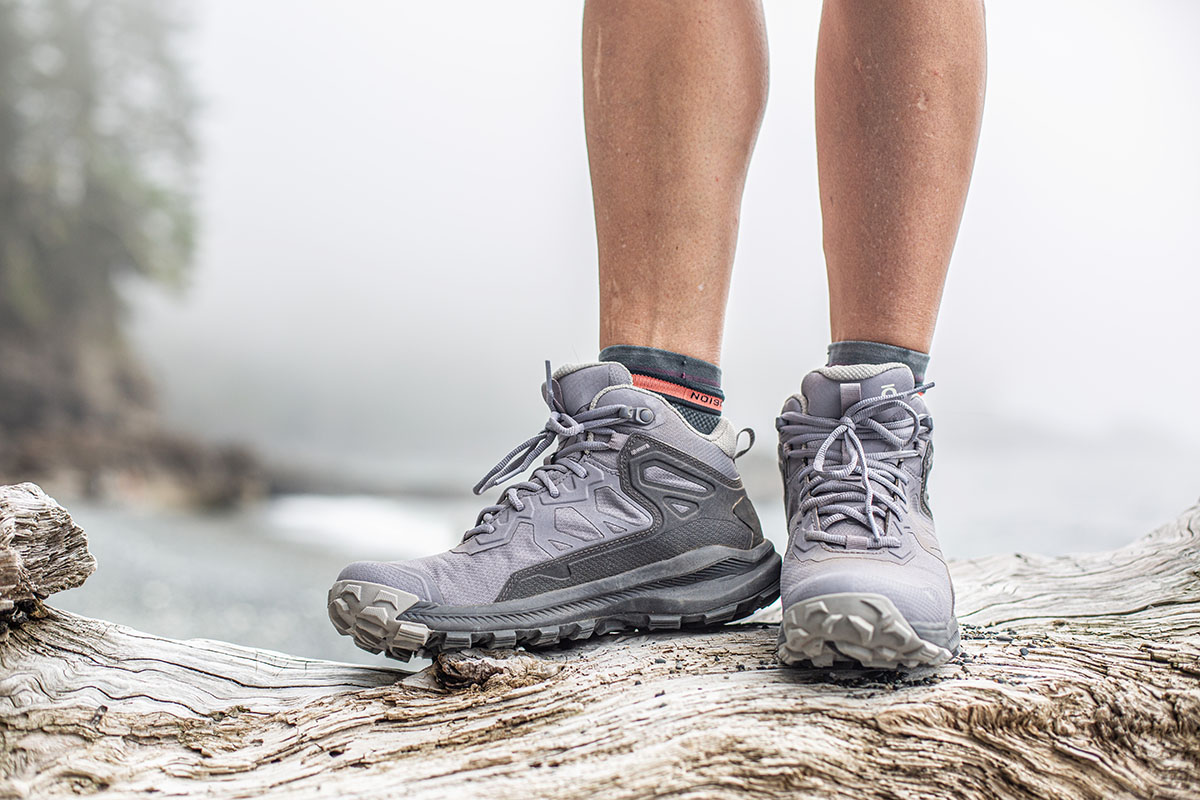
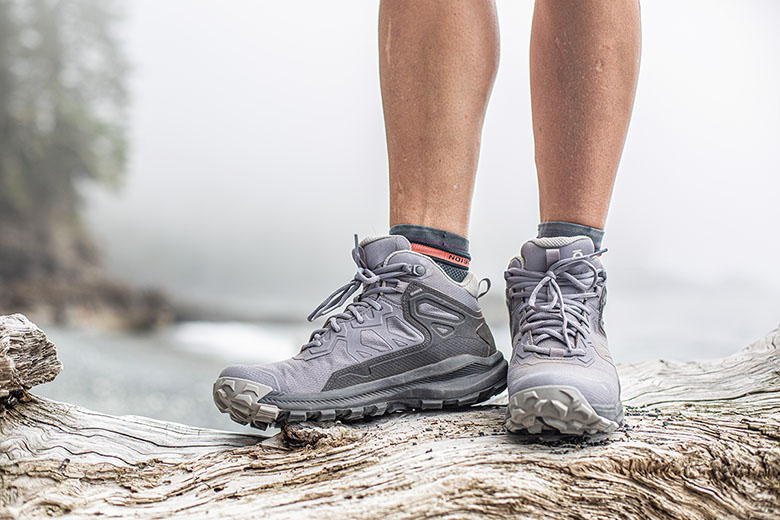
Price: $180
Weight: 1 lb. 11.3 oz. (women’s size 9)
Waterproof: Yes (B-Dry)
What we like: An impressively well-rounded fast-and-light design with a nice sustainability slant.
What we don’t: Sizing runs small; we have some concerns about long-term durability.
See the Women's Katabatic Mid Waterproof See the Men's Katabatic Mid Waterproof
Fast-and-light hiking boots are a rapidly growing category, and Montana-based Oboz recently threw their hat into the ring with the Katabatic. We put the women’s mid-height version to the test on Vancouver Island’s famed Juan de Fuca Trail, where it effectively balanced comfort, traction, and support—all at an impressively low weight. We did experience some tightness at the forefoot due to the narrow shape, and the minimalist build likely won’t hold up to long-term use as well as burlier boots, but the Katabatic makes fewer compromises than most other similarly intentioned designs we’ve tested. Below we break down our thoughts on the Katabatic Mid Waterproof. To see how it stacks up to the competition, see our articles on the best hiking boots and best women’s hiking boots.
Oboz is known for their comfort-first ethos, and the Katabatic Mid Waterproof carries the torch. I did experience some initial tightness at the forefoot of the right boot where I have a bunion, even after sizing up to a 9 from my usual 8.5, but the break-in period was brief. After just one short hike, the boots began to mold to my feet and now have a snug but comfortable feel (more in “Fit and Sizing” below). The O Fit insole is plush and well cushioned, the sole flexes nicely to allow for a natural gait, and the rock plate underfoot provides great isolation from sharp rocks below. Even after long days of hiking over grueling and undulating terrain with a loaded pack, my feet remained comfortable and hotspot-free. The Katabatic also has great energy transfer and allowed me to confidently boulder hop and navigate around roots and other obstacles while moving quickly on the trail. Added up, the Katabatic feels a lot like a trail runner but with noticeably more support and stability, which is a winning recipe for many modern backpackers.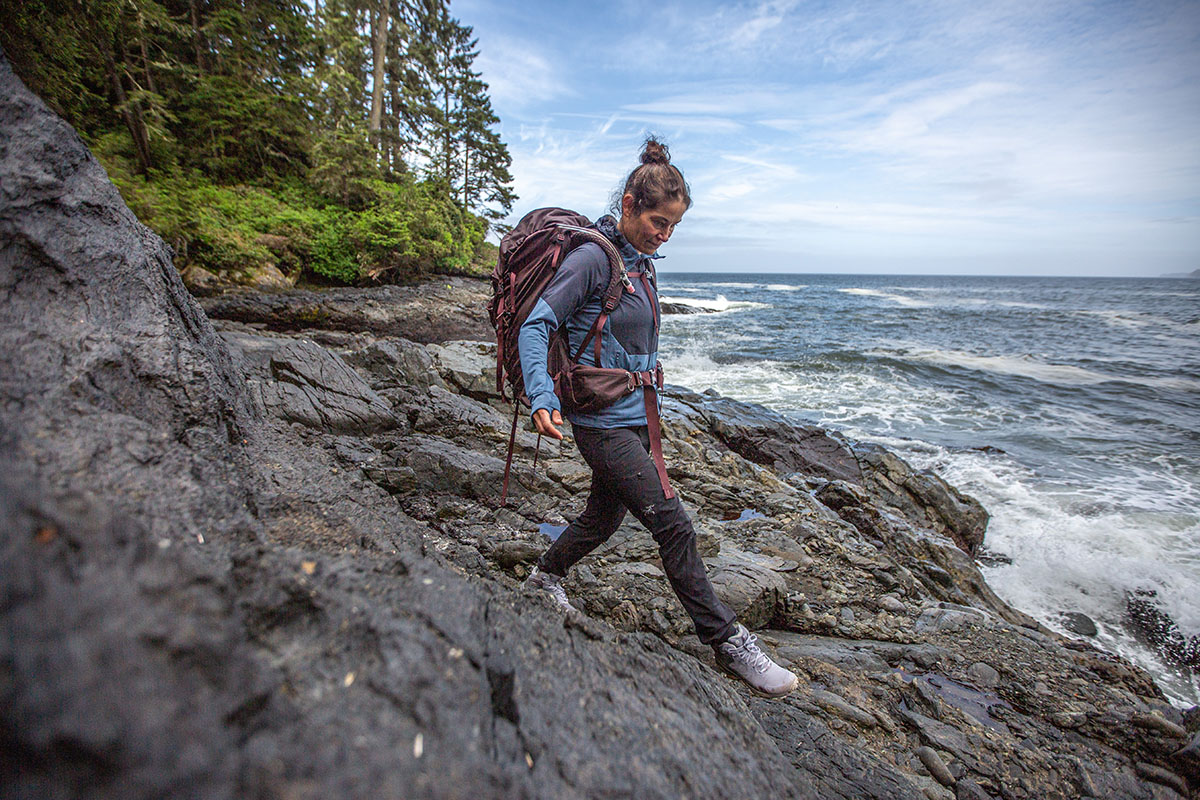
At 1 pound 11.3 ounces for the pair in a women’s size 9 (they’re listed at 1 lb. 10.8 oz.), the Oboz Katabatic Mid Waterproof is competitively light for such a well-cushioned and protective mid-height boot. For comparison, it stacks up well to other leading fast-and-light designs like Salomon’s X Ultra 4 Mid GTX (1 lb. 10.1 oz.) and Topo Athletic’s Trailventure 2 WP (1 lb. 10.2 oz.). You can go even lighter with a trail runner-inspired boot like Altra’s Lone Peak All-Wthr Mid 2 (1 lb. 8 oz.) or Salomon’s Cross Hike 2 Mid GTX (1 lb. 9.5 oz.), but those come with notable compromises in terms of stability and support. In my opinion, the Katabatic is a nice middle ground: It’s decidedly nimble and sprightly like a trail runner but has a much more secure and locked-in feel than the Lone Peak and Cross Hike (more in "Stability and Support" below).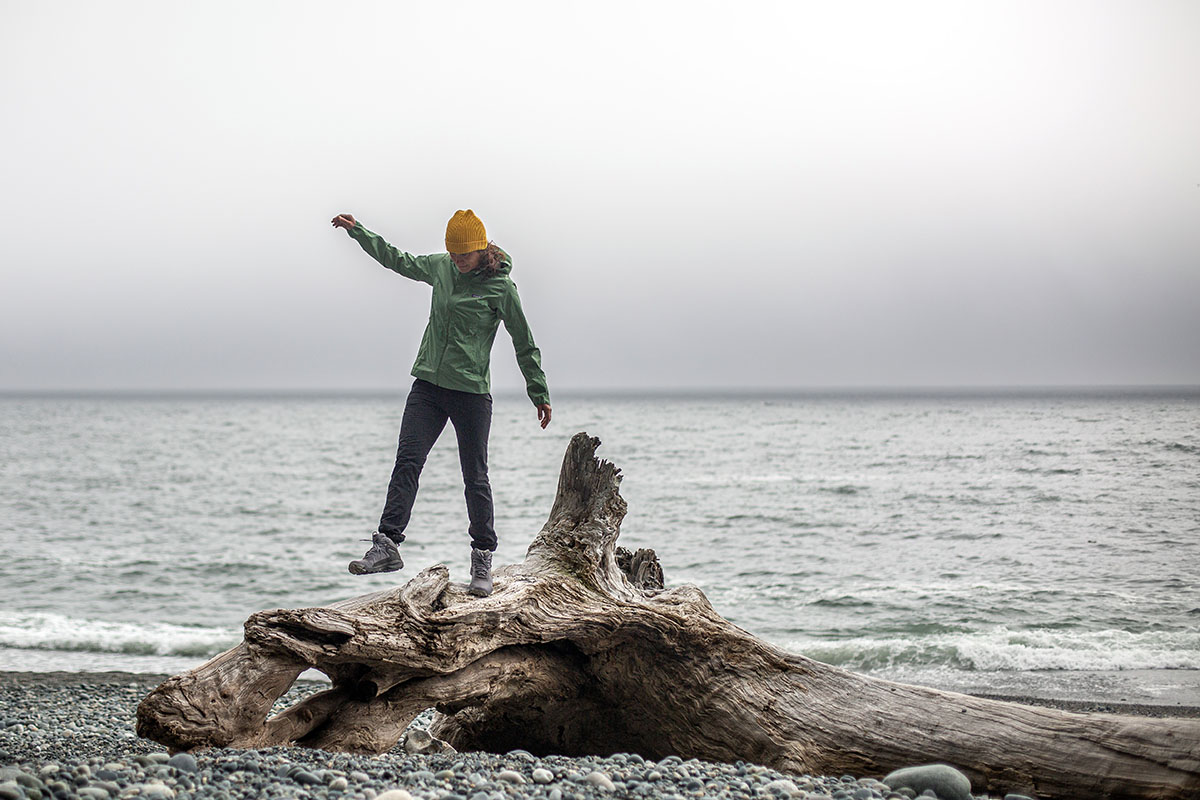
Along with comfort, traction is arguably just as much of a strong suit for the Katabatic Mid Waterproof. For reference, Vancouver Island’s West Coast is notorious for its varied and technical terrain, and the boots were exposed to everything from slimy boardwalks to deep mud, slippery roots, and pine needle-strewn sections of trail. Other portions of the hike traced the shoreline, which was rife with sand, tide pools, pebbles, and boulders. The Katabatic handled it all with aplomb: The Trail Tread outsole was impressively tacky on slick surfaces, and the deep, multi-directional lugs did a great job of biting into mud and dirt. The boots also have a slightly rockered shape with lugs extending over the toe box, which was very helpful for ascending steep slopes. Added up, it’s a very trustworthy and confidence-inspiring design.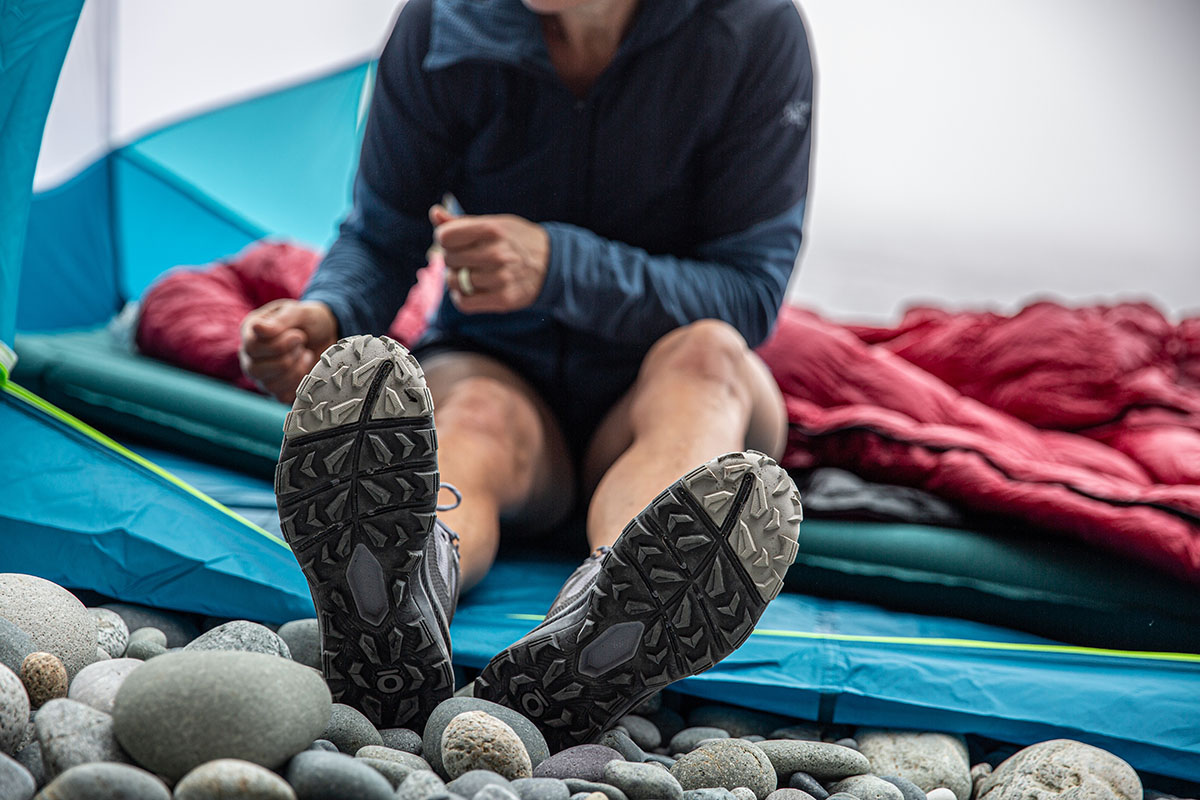
Oboz equipped the Katabatic Mid Waterproof with their in-house B-Dry membrane, which proved to be a capable and reliable performer in the wet. As I touched on above, the Juan de Fuca Trail was rife with slick mud and water crossings—I navigated streambeds, walked through puddles and mud pits, and endured rogue waves that lapped over my boots along the shoreline. One evening, I even stood directly in a stream for 5 minutes to filter water. While the upper grew noticeably wet with moisture, my hiking socks remained completely dry within the boot.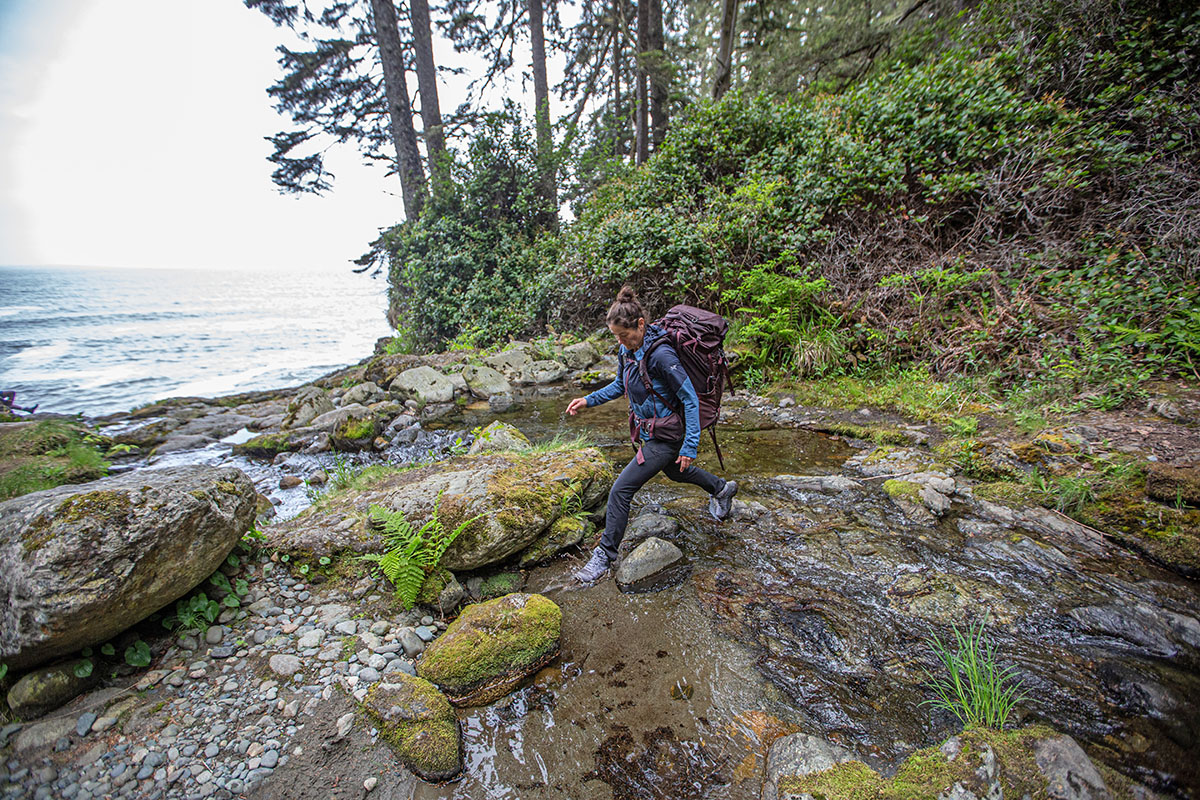
On that note, the Katabatic’s tightly woven mesh upper is great at helping seal out moisture but does sacrifice a little breathability. To be fair, my feet have never overheated in the boots, but temperatures were pretty mild on the Juan de Fuca Trail. I have yet to wear the Katabatic in true summertime heat, but I imagine that the non-waterproof version will be a better match in those conditions (there’s also a non-waterproof, low-top model available for those who don’t need the ankle coverage). For more on this topic, see our article: Do You Need Waterproof Hiking Shoes?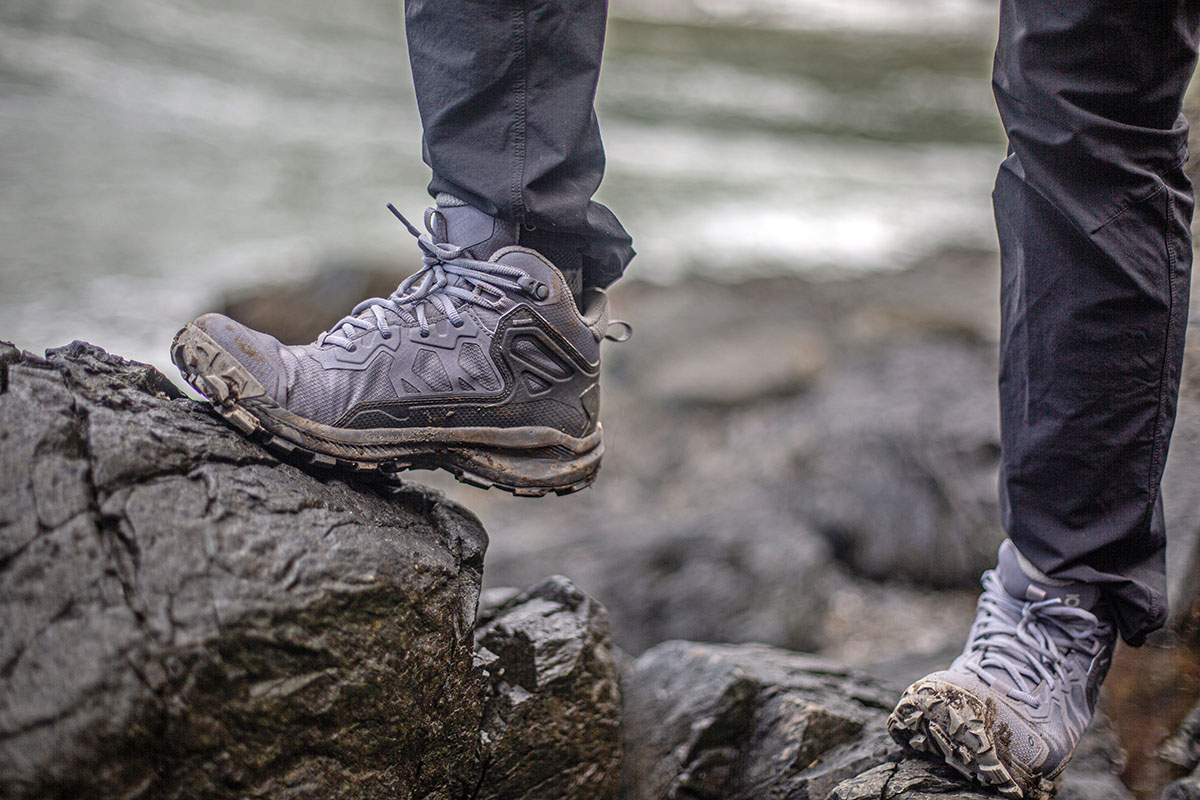
Fast-and-light hiking boots are often lacking in stability and support for covering long distances with a pack, but I was pleasantly surprised by the Oboz Katabatic. While the forefoot is decently flexible and allows for a very natural gait, Oboz included a rigid rock plate underfoot that provides a stable platform even on off-camber terrain. The well-cushioned collar and tongue also do an admirable job of locking the ankle in place—despite the consequential terrain we encountered on the Juan de Fuca Trail, I suffered no ankle rolls and felt very stable throughout our entire trip. Higher-riding designs like the Salomon Quest 4 GTX are a better match for demanding backpacking objectives with a heavy pack, but I feel that Oboz nailed an effective balance between weight and support for everything from day hikes to lightweight backpacking trips.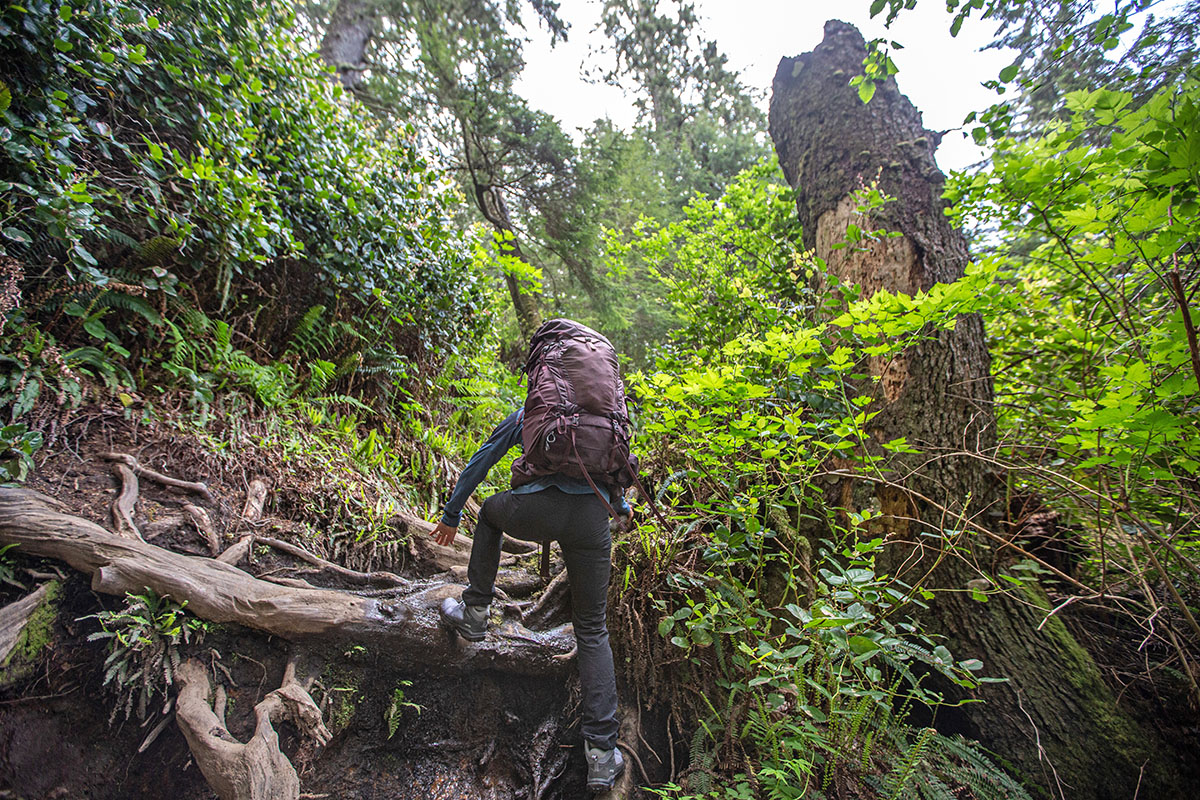
This was my first experience with Oboz boots, and I came away very pleased by the Katabatic’s overall quality. I do have concerns that the lightweight build may not last as long as burlier designs over the long term, but the boots have held up impressively well to testing thus far. The outsole is in great shape with no signs of wearing down, the laces and overlays look like new, and the mesh-heavy upper has done an admirable job of resisting snags and abrasion despite frequent contact with rocks and roots. Robust leather designs like Lowa’s Renegade GTX Mid or Salomon’s Quest 4 GTX will likely stand up better to long-term use—especially on demanding backpacking objectives and when hauling serious weight—but the Katabatic strikes me as very well built and hardwearing overall.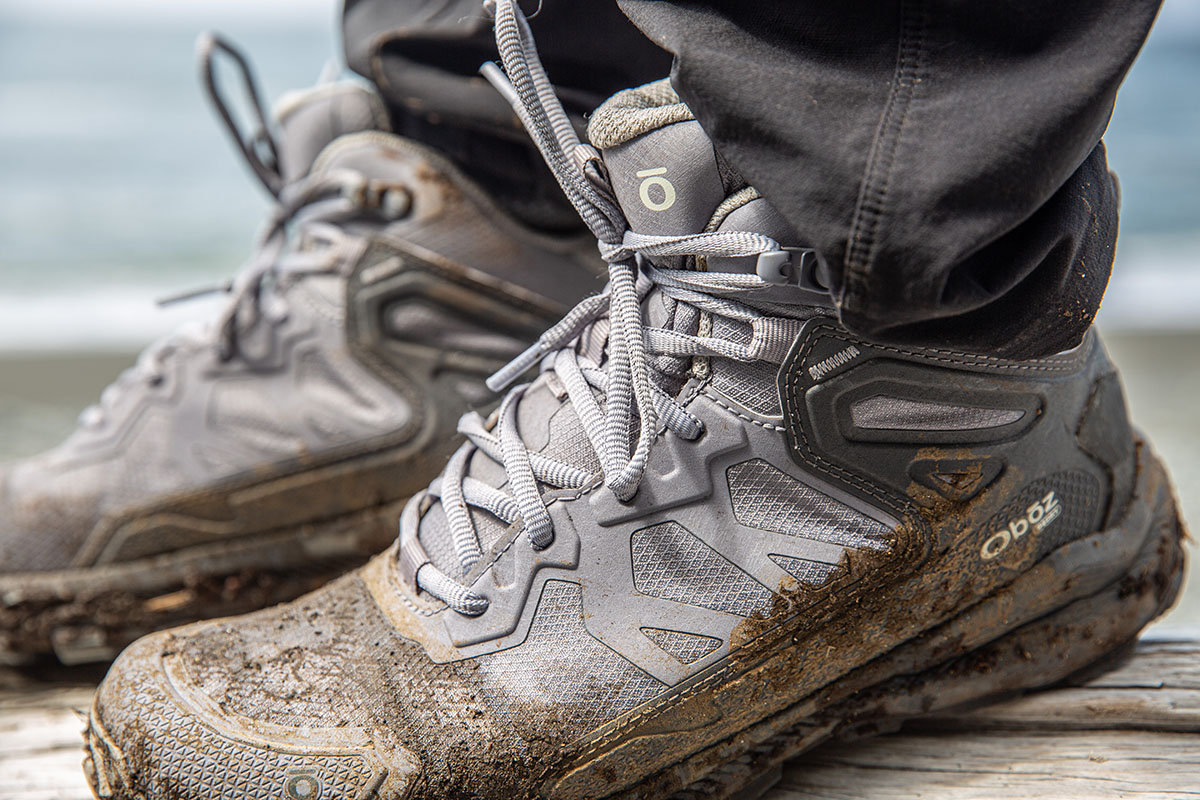
As I mentioned above, the Oboz Katabatic Mid Waterproof was a little narrow and restrictive in my usual women’s size 8.5—especially at the forefoot—so I opted to go up to a 9. Even after sizing up, the boots still felt pretty snug but wore in quickly and have since conformed nicely to my foot. The lacing system is relatively basic and doesn’t include any locking eyelets, but I’ve been able to achieve a secure all-around fit with no unwanted movement or rubbing inside the boots. It’s worth noting that there’s no consensus on the Katabatic’s fit—some women report it runs narrow (I fall into this group), while others say it has a wider-than-average shape. With that in mind, I highly recommend trying it on before you buy.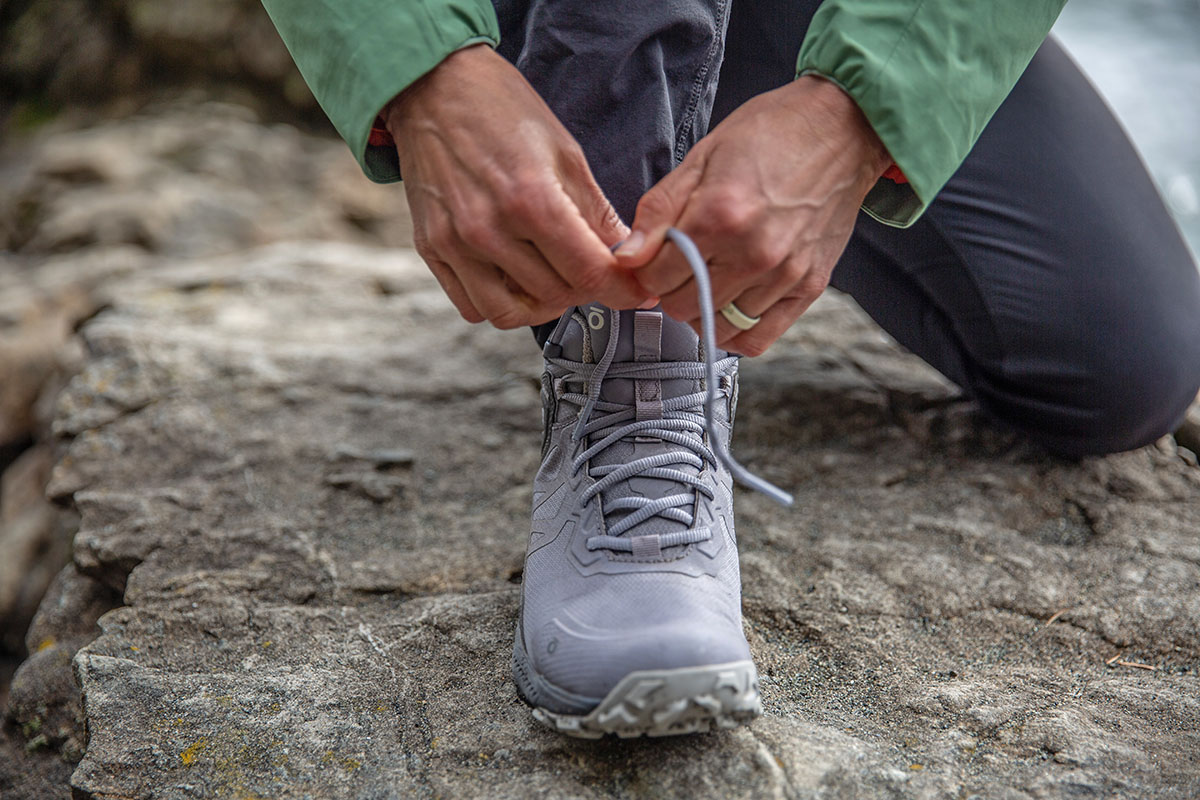
Oboz is a very environmentally conscious brand, and that ethos is apparent looking at the Katabatic’s construction. Namely, the O Fit Insole uses a fully recycled top layer, while the B-Dry waterproof membrane is 100% recyclable (a nice thought, although most users probably won't recycle it) and made from 25% post-industrial waste. Since their start in 2007, Oboz has also planted a tree for every pair of shoes sold to help farmers in developing nations feed their families and generate additional revenue. All in all, we applaud Oboz for going the extra mile and appreciate their ongoing commitment to social and environmental responsibility. 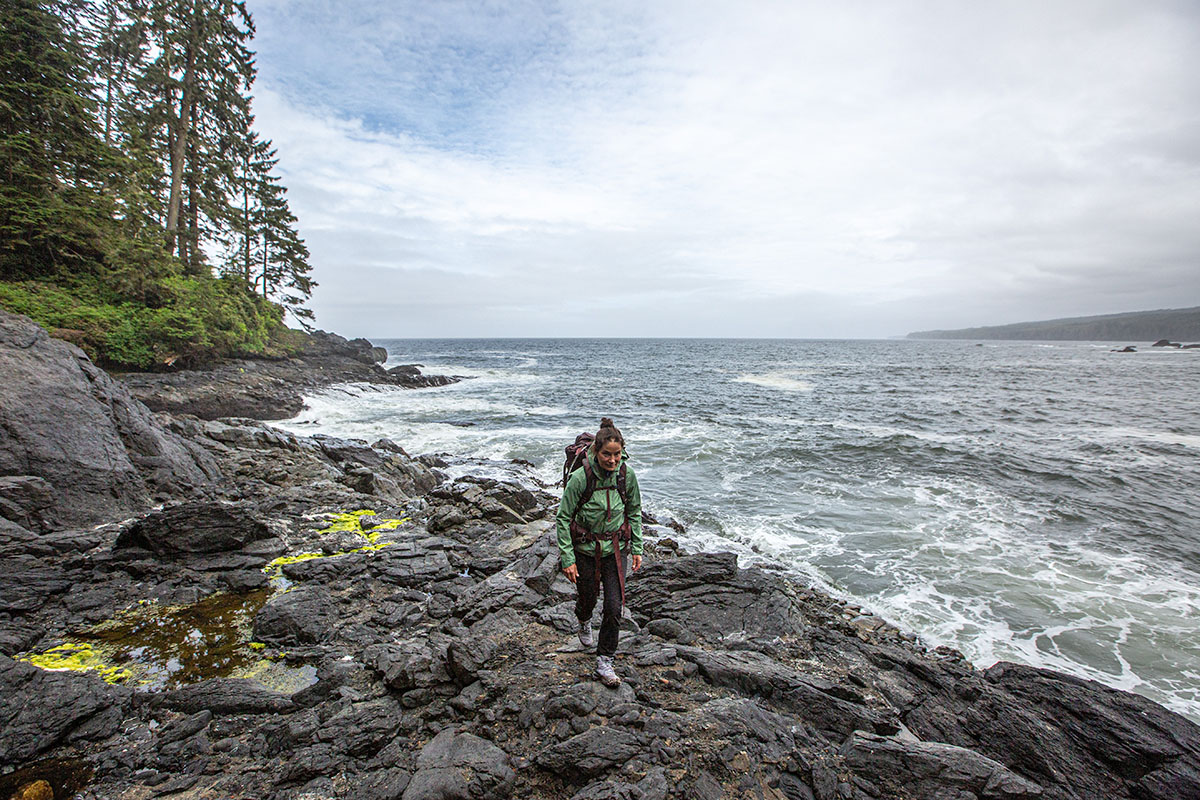
I covered the women’s Katabatic Mid Waterproof for this review, and Oboz also sells the boot in a dedicated men’s version for the same price. Stacked up against the women’s model, the men’s Katabatic Mid Waterproof is heavier at 2 pounds 0.6 ounces per pair, has a slightly wider fit (Oboz states it’s a C width in the heel and D in the forefoot), and is sold in different colorways but maintains an otherwise identical construction and feature set. As I touched on above, Oboz also offers the boot in a non-waterproof version that will save you $20 and 4.4 ounces in weight per pair (for the women’s model). Rounding out the collection, there are low-top shoes with or without waterproofing that retail for $160 and $140, respectively. Deciding between a boot and shoe will come down to personal preference and how you prioritize support, protection, and weight. 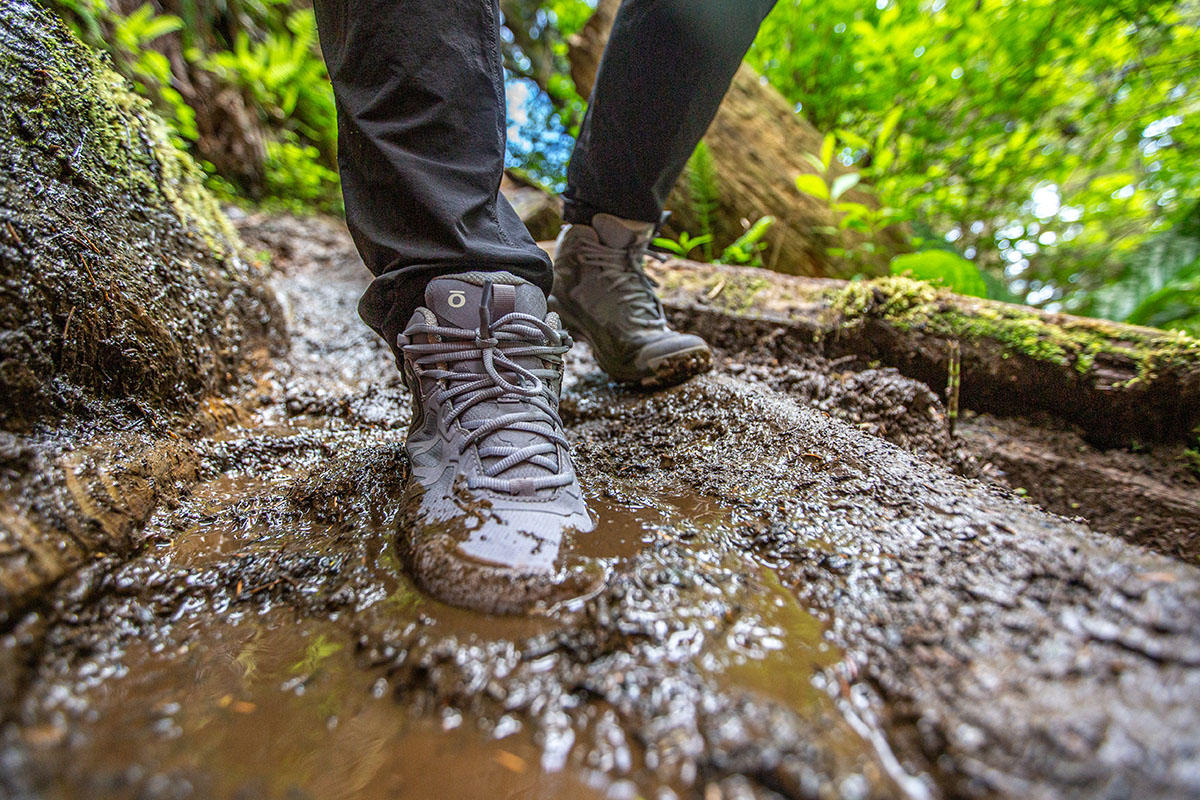
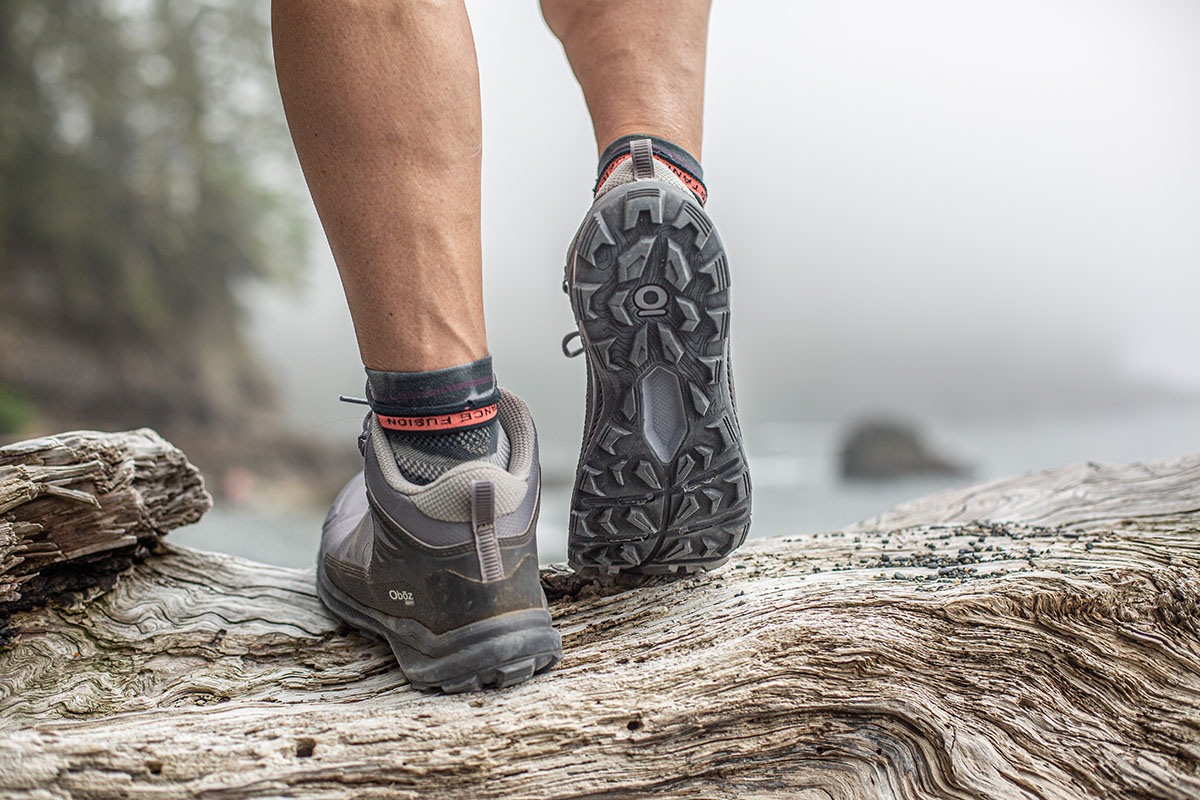
| Boot | Price | Category | Weight | Waterproof | Upper |
|---|---|---|---|---|---|
| Oboz Katabatic Mid Waterproof | $180 | Lightweight | 1 lb. 10.8 oz. | Yes (B-Dry) | Mesh |
| Topo Trailventure 2 WP | $180 | Lightweight | 1 lb. 10.2 oz. | Yes (eVent) | Synthetic |
| The North Face Vectiv Exploris 2 Mid | $179 | Lightweight | 1 lb. 11.1 oz. | Yes (Futurelight) | Synthetic |
| Salomon Outpulse Mid GTX | $160 | Lightweight | 1 lb. 7.1 oz. | Yes (Gore-Tex) | Synthetic |
| Salomon X Ultra 4 Mid GTX | $175 | All-around | 1 lb. 10.1 oz. | Yes (Gore-Tex) | Synthetic/textile |
The Oboz Katabatic Mid Waterproof is an impressively well-rounded fast-and-light hiking boot, but it’s not without competition. Our favorite lightweight design for women this year is Topo Athletic’s Trailventure 2 WP. For the same price as the Katabatic, the Trailventure boasts a similarly competitive mix of weight, traction, protection, and comfort. The eVent waterproof membrane is a reliable performer in the wet, the rock plate provides nice isolation from sharp rocks underfoot, and the proven Vibram Megagrip outsole offers great all-around grip. Unlike the relatively narrow Oboz, the Topo Athletic also boasts a wide toe box that can accommodate swollen toes after long days on the trail. The streamlined collar and accommodating fit do result in less support on off-camber terrain and while carrying a heavy pack (this was especially noticeable on steep descents), but the Trailventure is otherwise fairly uncompromised and gets our vote as the better-balanced design.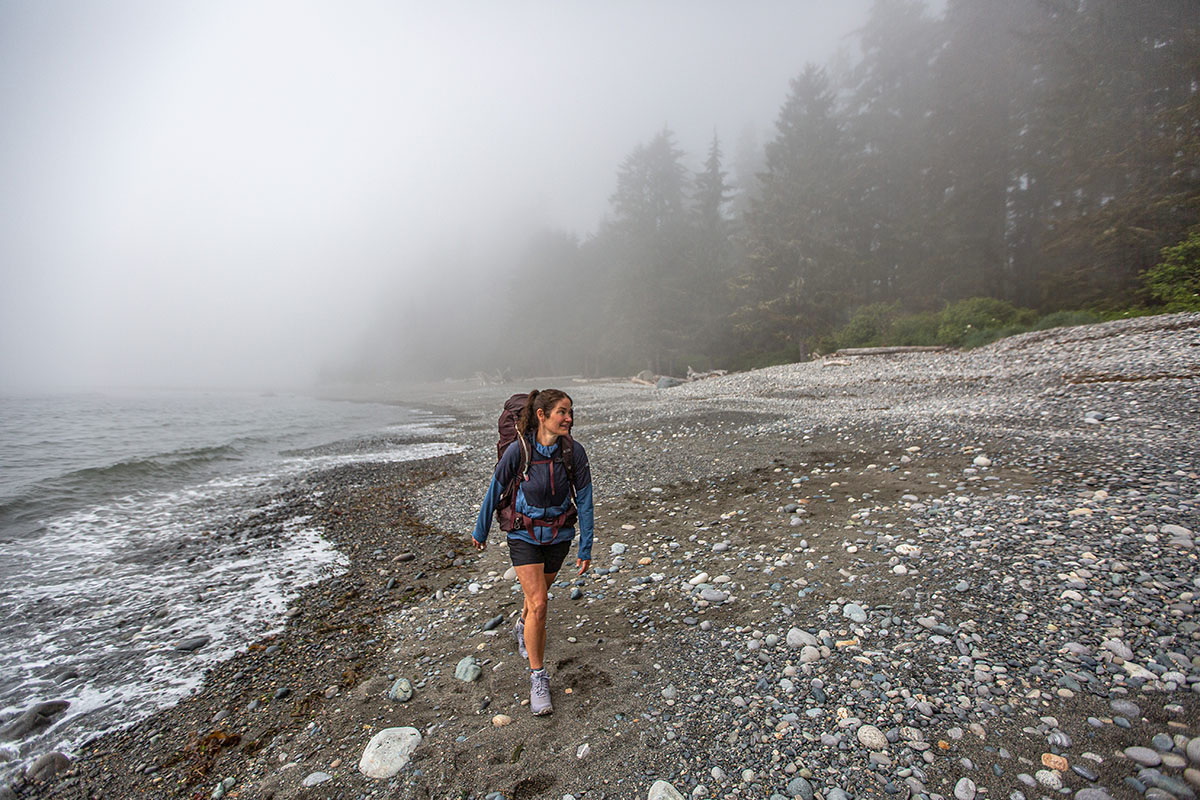
Next up is The North Face’s Vectiv Exploris 2 Mid Futurelight. Taking cues from their Vectiv trail running collection, the mid-height boot features a rockered profile for moving fast on the trail, a full-length TPU plate in the midsole for stability, and a lightweight yet durable synthetic ripstop upper. In testing, overall traction was excellent on everything from slippery rocks to mud, and the in-house Futurelight membrane held up extremely well despite very sloppy conditions (for more, see our in-depth Vectiv Exploris 2 Mid review). In terms of downsides, the rockered shape and generous midsole cushioning result in a less planted feel—especially on uneven ground or with a heavy load—and we found the forefoot to be much narrower than expected. But if it fits you well, the Vectiv Exploris is one of our favorite lightweight and quick-moving designs and balances its priorities a little better than the Katabatic, in our opinion.
Lightweight and nimble designs are becoming a dime a dozen, and Salomon’s Outpulse Mid GTX bears a strong resemblance to the Katabatic. Like the Oboz, the Salomon has a decidedly athletic and sprightly personality but retains surprisingly good stability with a firm TPU midfoot shank and reverse-camber shape that promotes a very natural stride. You also get Salomon’s capable Contagrip outsole and an upgraded Gore-Tex membrane for waterproofing. However, support and durability fall short of the Katabatic: The Salomon’s loose collar led to a fairly sloppy and loose feel, and the knit-like upper strikes us as more prone to tearing and snagging (although we haven’t had any issues to date). The Outpulse will save you $20 and 3.7 ounces in weight per pair, but the Katabatic wins out in traction, stability, and overall build quality.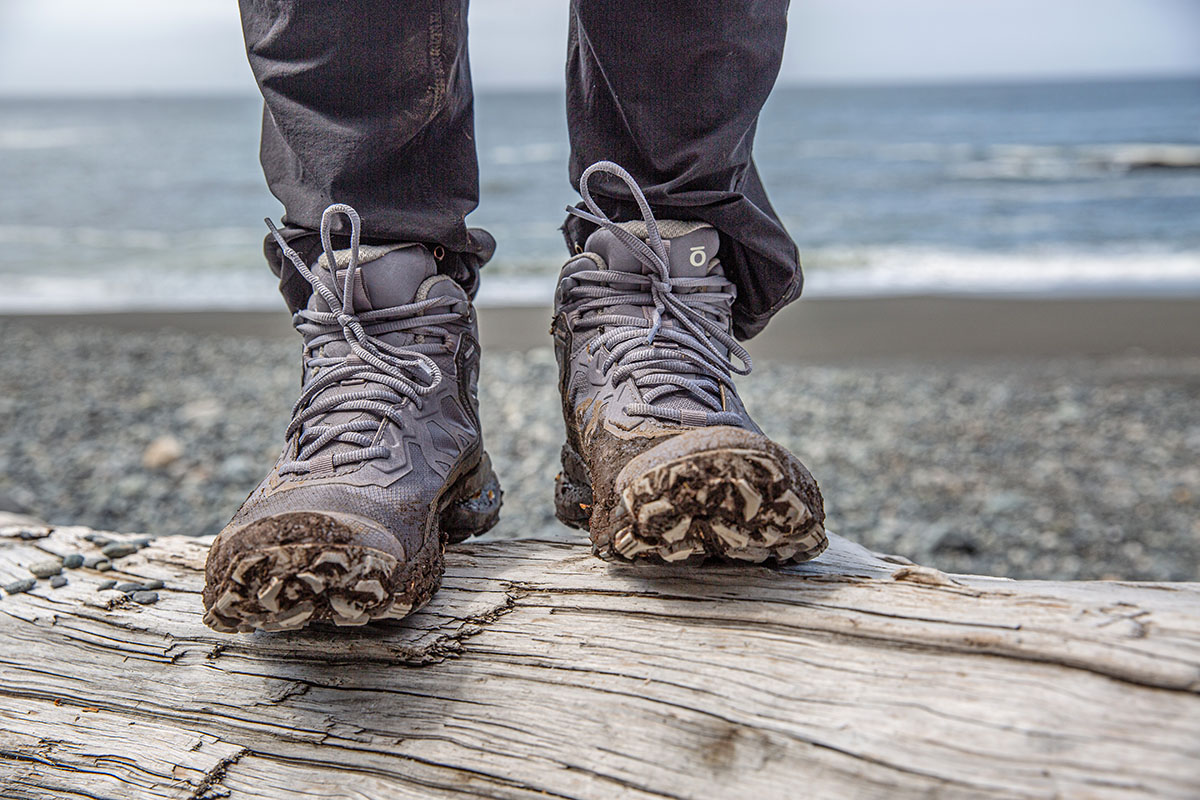
Last but not least, we’d be remiss not to include a comparison to Salomon’s popular X Ultra 4 Mid GTX. For $5 less than the Katabatic, the X Ultra 4 is similarly light at 1 pound 10.1 ounces, comfortable over long distances, grippy on most surfaces, and high on toe and ankle protection. That said, we don’t love all of the changes Salomon made with the latest iteration: The expanded toe box was overly roomy even for our wide-footed tester, and the stitched upper, bulky laces, and difficult-to-cinch collar gave the boot an awkward and cumbersome feel. Finally, not everyone will love the Quicklace system, which is faster than a traditional setup but more difficult to fine-tune. To be sure, the X Ultra 4 is a nice alternative for those who prioritize out-of-the-box comfort and protection (and not everyone will have issues with the fit), but the Katabatic strikes us as the more approachable design in this category.